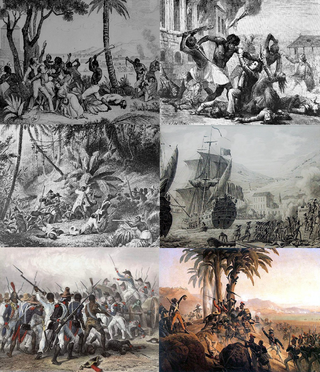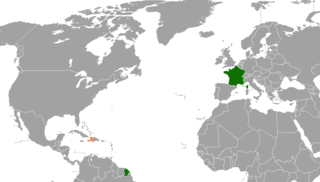
François-Dominique Toussaint Louverture also known as Toussaint L'Ouverture or Toussaint Bréda; 20 May 1743 – 7 April 1803) was a Haitian general and the most prominent leader of the Haitian Revolution. During his life, Louverture first fought and allied with Spanish forces against Saint-Domingue Royalists, then joined with Republican France, becoming Governor-General-for-life of Saint-Domingue, and lastly fought against Napoleon Bonaparte's Empire. As a revolutionary leader, Louverture displayed military and political acumen that helped transform the fledgling slave rebellion into a revolutionary movement. Louverture is now known as the "Father of Haiti".

Jean-Jacques Dessalines was the first Haitian Emperor, and leader of the Haitian Revolution, and the first ruler of an independent Haiti under the 1805 constitution. Initially regarded as governor-general, Dessalines was later named Emperor of Haiti as Jacques I (1804–1806) by generals of the Haitian Revolutionary army and ruled in that capacity until being assassinated in 1806. He spearheaded the resistance against French massacres upon Haitians, and eventually became the architect of the 1804 Haitian Massacre against the remaining French residents of Haiti, including some supporters of the revolution. He has been referred to as the father of the nation of Haiti.

Charles Victoire Emmanuel Leclerc was a French Army general who served under Napoleon Bonaparte during the French Revolution. He was husband to Pauline Bonaparte, sister to Napoleon. In 1801, he was sent to Saint-Domingue (Haiti), where an invasion force under his command captured and deported the Haitian leader Toussaint Louverture, as part of an unsuccessful attempt to reassert imperial control over Saint-Domingue and reinstate slavery on the local population. Leclerc died of yellow fever during the failed invasion.

James Napper Tandy, known as Napper Tandy, was an Irish revolutionary and a founder of the United Irishmen. He experienced exile, first in the United States and then in France, for his role in attempting to advance a republican insurrection in Ireland with French assistance.

The Haitian Revolution was a successful insurrection by self-liberated slaves against French colonial rule in Saint-Domingue, now the sovereign state of Haiti. The revolt began on 22 August 1791, and ended in 1804 with the former colony's independence. It involved black, biracial, French, Spanish, British, and Polish participants—with the ex-slave Toussaint Louverture emerging as Haiti's most prominent general. The revolution was the only slave uprising that led to the founding of a state which was both free from slavery and ruled by non-whites and former captives. The successful revolution was a defining moment in the history of the Atlantic World and the revolution's effects on the institution of slavery were felt throughout the Americas. The end of French rule and the abolition of slavery in the former colony was followed by a successful defense of the freedoms the former slaves had won, and with the collaboration of already free people of color, of their independence from white Europeans.

Benoit Joseph André Rigaud was the leading mulatto military leader during the Haitian Revolution. Among his protégés were Alexandre Pétion and Jean-Pierre Boyer, both future presidents of Haïti.

Louis Delgrès was a leader of the movement in Guadeloupe resisting reoccupation and thus the reinstitution of slavery by Napoleonic France in 1802.

Lieutenant General The Right Honourable Sir Thomas Maitland was a British soldier and British colonial governor. He also served as a Member of Parliament for Haddington from 1790 to 1796, 1802–06 and 1812–13. He was made a Privy Councillor on 23 November 1803. He was the second surviving son of James Maitland, 7th Earl of Lauderdale, and the younger brother of James Maitland, 8th Earl of Lauderdale. Maitland never married.

Hallie Rubenhold is an American-born British historian and author. Her work specializes in 18th and 19th century social history and women's history. Her 2019 book The Five, about the lives of the women murdered by Jack the Ripper, was shortlisted for the Wolfson History Prize and won the Baillie Gifford Prize for Non-fiction. Rubenhold's focus on the victims of murder, rather than on the identity or the acts of the perpetrator, has been credited with changing attitudes to the proper commemoration of such crimes and to the appeal and function of the true crime genre.
Julian Timothy Jackson is a British historian who is a fellow of the British Academy and of the Royal Historical Society. He is a professor of History at Queen Mary, University of London, he is one of the leading authorities on twentieth-century France.
The Elizabeth Longford Prize for Historical Biography was established in 2003 in memory of Elizabeth Longford (1906-2002), the British author, biographer and historian. The £5,000 prize is awarded annually for a historical biography published in the preceding year.

The Saint-Domingue expedition was a large French military invasion sent by Napoleon Bonaparte, then First Consul, under his brother-in-law Charles Victor Emmanuel Leclerc in an attempt to regain French control of the Caribbean colony of Saint-Domingue on the island of Hispaniola, and curtail the measures of independence and abolition of slaves taken by the former slave Toussaint Louverture. It departed in December 1801 and, after initial success, ended in a French defeat at the Battle of Vertières and the departure of French troops in December 1803. The defeat forever ended Napoleon's dreams of a French empire in the West.

France–Haiti relations are foreign relations between France and Haiti. Both nations are members of the Organisation internationale de la Francophonie, United Nations, and the World Trade Organization.
The Fondation Napoléon is a foundation, which registered as a French non-profit organization on November 12, 1987. Its mission is to encourage and support study and interest in the history of the First, and Second French Empires and to support the preservation of Napoleonic Heritage.
American Library in Paris Book Award was created in 2013 with a donation from the Florence Gould Foundation. It is awarded each November with a remunerative prize of $5,000 to "a work written originally in English that deepens and stimulates our understanding of France or the French.."
Alexander Mikaberidze is a Georgian lawyer, author and historian who specializes in Napoleonic studies. He is a full professor of history and social sciences at Louisiana State University in Shreveport, where he holds the Ruth Herring Noel Endowed Chair for the Curatorship of the James Smith Noel Collection, one of the largest private collections of antiquarian books, prints, and maps in the United States.
Michael George Broers is a British historian. Broers is the Professor of Western European History at the University of Oxford.

French emperor Napoleon Bonaparte (1769–1821) has a highly polarized legacy—Napoleon is typically loved or hated with few nuances. The large and steadily expanding historiography in French, English, Russian, Spanish and other languages has been summarized and evaluated by numerous scholars.

Mauritian nationality law is regulated by the Constitution of Mauritius, as amended; the Mauritius Citizenship Act, and its revisions; and various international agreements to which the country is a signatory. These laws determine who is, or is eligible to be, a national of Mauritius. The legal means to acquire nationality, formal legal membership in a nation, differ from the domestic relationship of rights and obligations between a national and the nation, known as citizenship. Nationality describes the relationship of an individual to the state under international law, whereas citizenship is the domestic relationship of an individual within the nation. In Britain and thus the Commonwealth of Nations, though the terms are often used synonymously outside of law, they are governed by different statutes and regulated by different authorities. Mauritian nationality is typically obtained under the principle of jus sanguinis, i.e. by birth in Mauritius or abroad to parents with Mauritian nationality. It can be granted to persons with an affiliation to the country, or to a permanent resident who has lived in the country for a given period of time through naturalisation.













